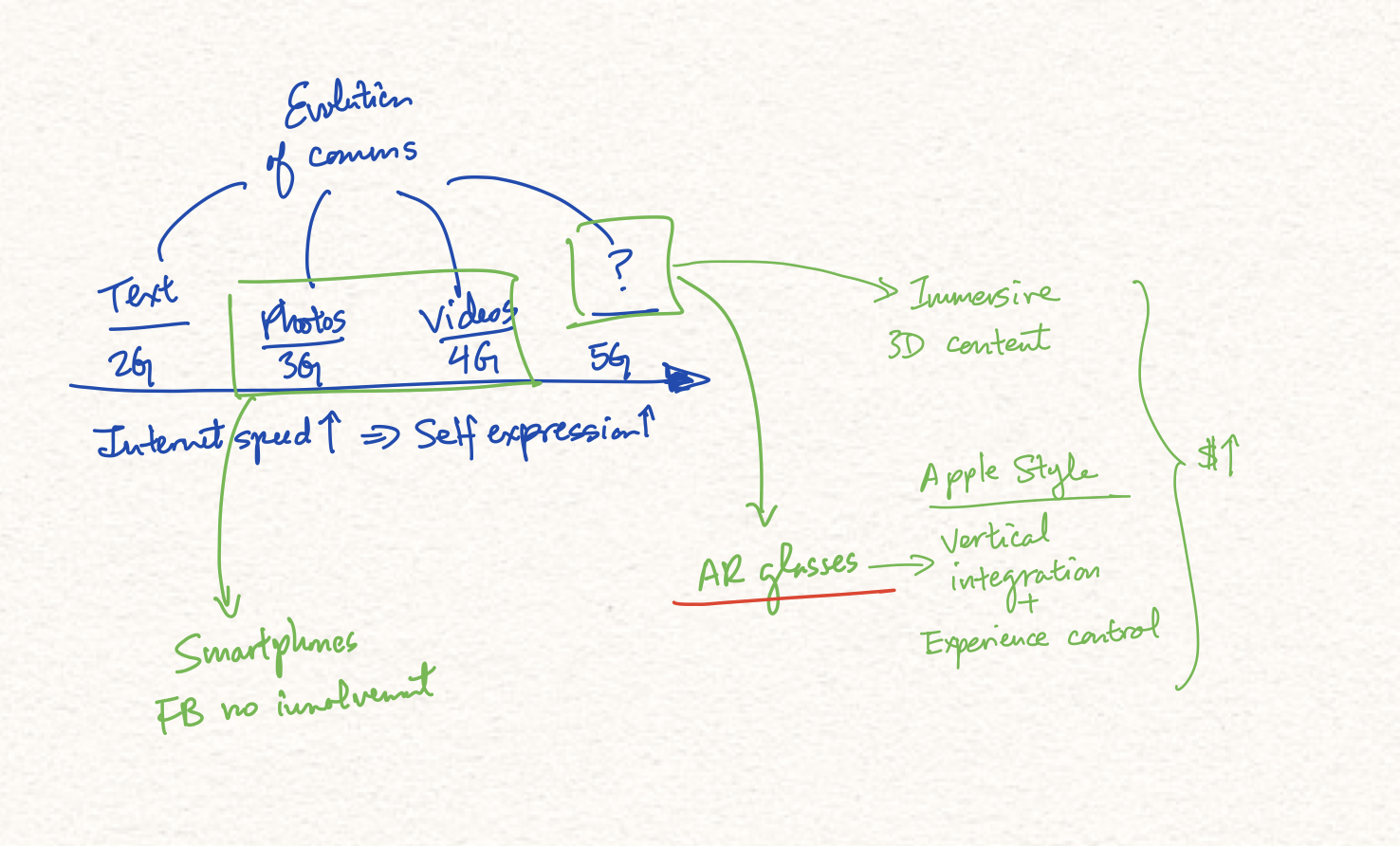Market Signaling & Self Fulfilling Prophecies
Mind Mind of the Zuckerberg interview
Facebook changing its name to Meta instantly made headlines and catapulted the term "Metaverse" into mainstream similar to what Pokemon Go did with "Augmented Reality" (despite not being true AR at launch). I mind mapped a short Gary Vee interview with Mark Zuckerberg to demo for an upcoming YouTube video tutorial and gleamed some insights on what Facebook stands to gain from this dramatic rebranding. This will also show you how I use mind mapping to break down complex issues into digestible chunks, which can then be analyzed with contextual knowledge and frameworks.
Evolution of Communication
First is the evolution of communication, which is driven first by telecommunication (telco) infrastructure. The diagram below illustrates how we moved from text to video following the deployment of 2G to 4G. With more advanced devices and apps, our ability to express ourselves has also increased drastically. Since Facebook is in the business of monetizing identity (more on this later), it has profited immensely from our increased self expression capabilities.
Sharp eyes will notice that this diagram is a child node of the larger mind map above.
As we move into the 5G and Metaverse era, Facebook is looking to capture much more of the value chain.
Controlling the Device Layer
Our current paradigm can be roughly seen as a triple layered cake of infrastructure, devices and applications.
Samsung, Huawei, and especially Apple (thanks to the App Store) captured huge value in the Web 2.0 mobile era. During this time, Facebook, as an "over the top" (OTT) applications player, could only profit off ads revenue generated from usage rather than the sale of hardware. To give you a sense of how big device sales can be, Apple's revenue last year was $274 billion (over 80% coming from iPhones and Macs) while Facebook hulled in $86 billion mostly all from targeted ads.
If FB is able to come out with viable Metaverse devices like AR glasses or VR goggles, then they potentially have $billions to gain. Experience ecosystems (see next section) and physical goods distribution channels (i.e. retail sales and direct-to-consumer delivery systems) take time to build and below is how I see Facebook playing their cards today.
Facebook also don't have much say in how current smartphones are made, which sometimes creates friction between the device manufacturers and the social media giant, especially over privacy since user data's directly tied to FB's ability to target ads. In Zuck's words, he wants to build next generation devices from the ground up "around social". Depending on your opinion of FB, this could either mean designing products that make us more connected and efficient or occupy our time even more to better serve FB’s ads business model. It’s also possible that if Facebook becomes less reliant on ads thanks to new hardware and apps revenue, it might actually move away from being so aggressive in sucking up our attention. But given the profit-driven nature of a public company, I wouldn’t hold my breath. Or perhaps we should rely on the altruism of one man, which I’m not sure is a great option either. No dig on Zuck, just out of principle.
Apps vs Experiences in the Metaverse
Speaking of the applications layer, Zuck never once mentioned the word "Apps" and instead kept throwing around the term "Experiences". This is because in the AR/VR/XR world (I'm so glad they just settled on "Metaverse" because all these R's, which stands for "Realities", confused the crap out of everyone!), there technically doesn't exist apps. At least not in the way we know them today.
Imagine a future where we're all wearing (non-glasshole) AR lenses. Since the device is now on your face and its "screen" encompasses your entire field of view (FOV), you won't be tapping into apps like you'd do with your current smartphone. Combined with machine learning, contextual cues (ex: your typical lunch time or biosensors to know you're hungry), and user data (what the service knows about your behavior and preferences), companies like Yelp or Doordash can just push restaurant and food recommendations in front of you at the right time and place. You can then confirm an order via voice control. This is an "Experience".
With Apple bringing in over $60 billion annually from the App Store, FB's looking at a pretty sweet payoff if it can create the next "Experiences Store". In fact, you'll notice that every game is called an Experience on the Meta Quest website, so that positioning is already happening.
Self-Fulfilling Prophecies in Tech
It's common practice in internet tech to announce new products way ahead of when it actually launches publicly. This usually happens at annual developer conferences like Google I/O and F8. This signifies to the market that these companies are now pouring resources into a particular area, which elicits a response from competitors, rallies investors and ecosystem partners, and, most importantly for Facebook in this instance, attracts talent. This whole cascade of market reactions then increases the likelihood of the original announcement becoming reality, thereby completing a self-fulfilling prophecy.
Renaming your entire company to back a new technology platform is a bold move no matter how you look at it. It serves to focus the company internally. And it's not lip service either with the company putting a fifth of its employees on Metaverse related activities and investing, according to the interview, $10 billion annually into its development. It also acts as a beacon telling all those wanting to work on the future to come to Facebook.
Amazon vs Facebook: Transactions & Identity
One final thing I found fascinating was Zuck briefly mentioned that Amazon is about commerce and monetizes on goods and service transactions while Facebook is about expression and monetizes identity. This shoots straight to the nature of these companies and their core competencies, which translates to how we'd expect them to behave in the market.
This means Amazon will try to optimize for distribution, shipping speed, and selection. On the other hand, Facebook and its products tries to get you to share who you are, and in the process learn who you are in order to match you to better advertisers, thereby increasing advertiser sales leading to increased advertiser spend on the FB platform. Cha-ching!
Related to the business of Identity is NFTs and the Metaverse. But we'll save that for a future post.





